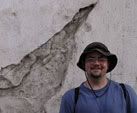
Saturday, March 26, 2005
DATELINE: Saturday, March 26, 2005
Saturday morning brought yet another late rise for most of the camp, but not for me. I wasn't able to do much power sleeping.
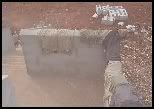 So I got up, and headed back to the showers for yet another attempt at washing my clothes. This time things went much better. I'd left the clothes from my second cleaning attempt soaking in the real Woolite all night, so they were quite willing to suds up that morning. I washed out every last dirty item I'd brought and spent a fine few minutes laying everything out on the concrete steps. The steps might not have been OSHA-approved, but their concrete railing turned out to be a terribly effective clothes dryer. And with the wind blowing as much as it was that morning, you always knew when your clothes were dry because the wind would whip them over the edge of the rail and into the red dirt. *BING*
So I got up, and headed back to the showers for yet another attempt at washing my clothes. This time things went much better. I'd left the clothes from my second cleaning attempt soaking in the real Woolite all night, so they were quite willing to suds up that morning. I washed out every last dirty item I'd brought and spent a fine few minutes laying everything out on the concrete steps. The steps might not have been OSHA-approved, but their concrete railing turned out to be a terribly effective clothes dryer. And with the wind blowing as much as it was that morning, you always knew when your clothes were dry because the wind would whip them over the edge of the rail and into the red dirt. *BING*After breakfast and our morning devotional with Butch, Marcello took those of us who wanted to on a tour of the camp itself. We started by climbing back up the big hill right to the zip-line area where we could get a look at the camp in its entirety. It was extremely hot atop the hill. In fact, while considerably less humid, the day seemed far hotter than just about any day of the trip thus far. I was glad I’d worn a hat and sunscreen to keep from being burnt to a crisp.
Marcello explained that almost exactly one year before, all of the land that we could see was simply farmland—however, it was farmland up for sale. Marcello had been looking for a place that Word of Life could build a permanent camp structure that could be used year-round. After much searching and prayer, he learned of the farmland and came out to see it. He had no money whatsoever with which to even make a down-payment and no real means to secure any kind of loans, but he could see how ideal the land was for such a camp. The only other thing he had was faith.
During one of their previous visits, Marcello brought Rick Brooks and some other Nehemiah Network missionaries to the site and explained his plan. He showed them where he wanted to put the first buildings, the cabins, the bano-houses and everything else. They didn’t know quite what to say at first, for Nehemiah Network doesn’t have that kind of money on its own. However, they too have faith and know that God can make the necessary arrangements when it comes to helping his people accomplish his work. Within weeks of beginning the project, individuals and organizations came forward asking how they could help. The land was soon purchased. Within a short time later, a work team came in and began building the first kitchen building. More prayers were made and more money came in. They soon had cabins and shower-houses and with the help of more work-teams the foundations and beginning structure for the pavilion. The zip-line was also added as was a climbing-wall and basketball court. And the week before we arrived, the men’s cabins were completed.
We’d seen some of this construction ourselves throughout the week, with work continuing on the pavilion’s façade and the completion of the rock road and a sidewalk. The basketball court was next to their sites. He explained that he’d had no money to start the basketball court so he had traded his car to a local hardware store for the materials needed. After they got the court finished, his car stopped working and the hardware store owner demanded a refund. About that time, more money came in so he was able to do so.
An amazing amount of work had been accomplished in just a year and every bit of it had been fully paid for.
Marcello isn’t finished, though. He has a great plan for expanding the camp even further. However, Marcello's goal is not to simply raise buildings for the sake of doing so. Sure, he might appear insane to the average Joe who has to ride with him, but he is not. there is much method to his perceived madness. He loves the Lord and has made it his life's mission to serve by witnessing. He intends to fill the camp with people as often as possible, so that they can have ongoing weekly summer camps as well as mission housing for groups such as ours. There are also plans to possibly expand the camground itself onto some adjacent property. He asked us all to be in prayer about this matter, so I pass the request on to you here.
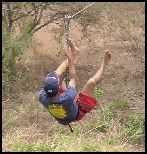 After Marcello spoke to us, one of the missionaries, Douglas, came up and began setting up the zip-line. We all watched as he strapped himself into the zip-line harness, clipped it to the pulley that he’d installed on the line itself, double-checked his rigging and then ran off the short running platform built onto the side of the hill. Douglas flew down the line, hanging probably 40 feet off the ground at the lowest point of the valley between tall hills. Before he was even a quarter of the way into his journey, though, he leaned back and flipped upside down, waving to us as he continued across. That’s when we noticed he was barefoot. He flew, barefoot and upside down across the valley, then, just before he reached the other side of the hill, he righted himself and came to a landing. We all clapped and were terribly impressed at this show. Douglas unclipped himself from the pulley, un-clipped the pulley from the wire and then charged back up the rocky face of the hill, still barefooted, to where we stood on the top. You could not get more macho than that and I think we all felt a bit of disappointment that this guy had been so good, not to mention tough of foot, so soon out of the gate. Didn’t leave a lot of room for us tender-footed Gringos to be impressive on this thing.
After Marcello spoke to us, one of the missionaries, Douglas, came up and began setting up the zip-line. We all watched as he strapped himself into the zip-line harness, clipped it to the pulley that he’d installed on the line itself, double-checked his rigging and then ran off the short running platform built onto the side of the hill. Douglas flew down the line, hanging probably 40 feet off the ground at the lowest point of the valley between tall hills. Before he was even a quarter of the way into his journey, though, he leaned back and flipped upside down, waving to us as he continued across. That’s when we noticed he was barefoot. He flew, barefoot and upside down across the valley, then, just before he reached the other side of the hill, he righted himself and came to a landing. We all clapped and were terribly impressed at this show. Douglas unclipped himself from the pulley, un-clipped the pulley from the wire and then charged back up the rocky face of the hill, still barefooted, to where we stood on the top. You could not get more macho than that and I think we all felt a bit of disappointment that this guy had been so good, not to mention tough of foot, so soon out of the gate. Didn’t leave a lot of room for us tender-footed Gringos to be impressive on this thing.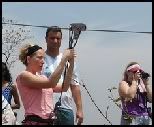 After this, we began to take turns with the zip-line. The only drawback to this was that while we had three sets of harnesses, meaning two people could be getting harnessed up while one zipped down the line, we only had one pulley with which to zip. So the person who went down the line had to run back up before the next person could go. I’d say most of the team members who went down the line were ready and willing to do it. For a few, though, it was a tough choice to go. We had more than one person who had to conquer their fear of heights in order to go and one of them—I don’t want to say her name so as not to embarrass her, but it was Michelle—turned around mid-way down and mouthed “NEVER AGAIN!” at us. She was still proud she had done it and we of her.
After this, we began to take turns with the zip-line. The only drawback to this was that while we had three sets of harnesses, meaning two people could be getting harnessed up while one zipped down the line, we only had one pulley with which to zip. So the person who went down the line had to run back up before the next person could go. I’d say most of the team members who went down the line were ready and willing to do it. For a few, though, it was a tough choice to go. We had more than one person who had to conquer their fear of heights in order to go and one of them—I don’t want to say her name so as not to embarrass her, but it was Michelle—turned around mid-way down and mouthed “NEVER AGAIN!” at us. She was still proud she had done it and we of her.As for me, I wasn’t really concerned about falling off the wire on the way across—I was more concerned with what I was going to do once I got off the ramp. I’d been watching most of the other folks go and most of them were turning upside down and doing similar things on the way. I wanted to do something different, yet memorable with my turn, but was unsure what might qualify. I didn’t want to turn upside down—not that I was afraid to, but it had so been DONE, already. The only thing that really jumped out at me was to go down the zip-line with the harness on backwards, so that I would be stomach to the ground instead of butt to the ground. I envisioned running off the end of the ramp, thrusting my arm out and bending one leg in classic super-hero flight pose and singing “I Am Superman” all the way over. The staff had even mentioned such a move was possible. But was it wise?
The thing I had to seriously consider was that this zip line had not been designed to accommodate Gringos. See your average Guatemalan is much smaller than your average American. I don’t mean that Americans are all big and fat by comparison, (though that would probably be a valid observation), I mean that Guatemalans are simply smaller people who therefore don’t weigh as much as we do. This zip-line was constructed with their average weight in mind and I noticed that when some of the
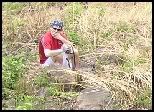 guys went off the ramp they came dangerously close to hitting the rocks just beyond the ramp. And these were guys much smaller than my fat butt. The two people who came closest to my weight were Dwan, a former professional football player, and Tom, a muscular guy who’s about half a foot taller than me. Dwan came within centimeters of losing his butt on a rock as he went off the ramp. And Tom had to lift himself up by the bungee cord pulley connector to avoid hitting. I was afraid that I might hit going off normally, let alone the pain and humiliation of scraping off my entire front by attempting a Superman. I decided that it was definitely an unwise move on my part and should be left to a light-weight girl. I needed to come up with something else.
guys went off the ramp they came dangerously close to hitting the rocks just beyond the ramp. And these were guys much smaller than my fat butt. The two people who came closest to my weight were Dwan, a former professional football player, and Tom, a muscular guy who’s about half a foot taller than me. Dwan came within centimeters of losing his butt on a rock as he went off the ramp. And Tom had to lift himself up by the bungee cord pulley connector to avoid hitting. I was afraid that I might hit going off normally, let alone the pain and humiliation of scraping off my entire front by attempting a Superman. I decided that it was definitely an unwise move on my part and should be left to a light-weight girl. I needed to come up with something else.At last, after about 12 of the team had gone, it was my turn and I was given a harness. I gave Butch my camera and asked him to take some video footage of my trip.
“Oh, you don’t want to take footage on the way down?” Butch asked. He’d done precisely that on his way and said that it was easy to do.
“Nope. I’m gonna need my hands for other things,” I said. My new plan was to leap off the ramp, lift my legs to get beyond the rocks, then lie back in the air with my hands wrapped behind my head in Relaxation Pose and zip down like that. Seemed distinctive and funny enough to work and would save me grievous injury. After I got harnessed up, Sandra Waddell asked me if I would like to borrow her sandals for the trip. I was in flip-flops, which I didn’t think were great footwear for a run back up the rocky hill, but I wasn’t going to complain either since Douglas had taken it barefooted. I decided to take Sandra up on her offer, though.
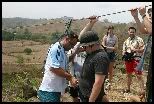
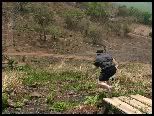 Soon my harness was clipped to the pulley and Marcello Hounko gave me one last harness test and said I was ready. Without hesitation, I grabbed my bungee and ran off the edge of the ramp. My weight immediately pulled down on the high-tension wire and I dropped a bit. I had been trying to remember to pull my legs up to avoid the rocks, but I evidently didn’t pull them up enough because I smacked the top of my right foot hard on a rock and screamed a mighty “Ow!!!” I’m rather proud that "Ow" was all I screamed. I was then presented with a choice: A) I could tend to my wounded foot and see if it was broken; or B) I could not waste my trip down and go ahead with my
Soon my harness was clipped to the pulley and Marcello Hounko gave me one last harness test and said I was ready. Without hesitation, I grabbed my bungee and ran off the edge of the ramp. My weight immediately pulled down on the high-tension wire and I dropped a bit. I had been trying to remember to pull my legs up to avoid the rocks, but I evidently didn’t pull them up enough because I smacked the top of my right foot hard on a rock and screamed a mighty “Ow!!!” I’m rather proud that "Ow" was all I screamed. I was then presented with a choice: A) I could tend to my wounded foot and see if it was broken; or B) I could not waste my trip down and go ahead with my 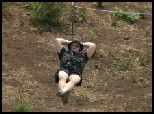 Relaxation Pose despite the pain and worry about my foot later. I chose B. It worked splendidly too. I spun in the air on the way down, lay back in relaxed pose and grinned for the camera. The trip lasted less than 40 seconds.
Relaxation Pose despite the pain and worry about my foot later. I chose B. It worked splendidly too. I spun in the air on the way down, lay back in relaxed pose and grinned for the camera. The trip lasted less than 40 seconds.On the other side, I landed on my good foot and then helped Douglas unhook me from the line. My injured foot did hurt, but not all that bad. I figured it would hurt worse later on, but I probably had a few minutes to get up the hill with it without too much problem. I grabbed up the pulley and started running.
About mid-way up the hill, my limp became more pronounced, but I made it up fine. Once I got Sandra’s sandals off, I could see that my foot was scraped on the top, but not horribly. It was already turning a little blue, though. After returning Sandra’s shoes, I decided I’d had enough of the sun and adventure for the moment and needed to take my foot to the nearest reputable doctor and/or near-doctor wife.
She pronounced, “Eh, keep an eye on it.”
I hobbled up the hill to the coolness of the men’s cabin. It felt so nice inside. My fellow team-mate Aman was putting up the hammock he’d purchased in Antigua, stringing it between two ends of a cross-beam and debating whether or not he would sleep in it that evening. I sat on my bunk, looked my foot over a bit and chatted with the guys.
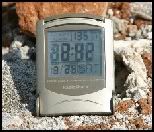 Someone had brought a digital thermometer and David H. had put it in the sun at the edge of the cliff outside our door. He would then check it every five minutes to see how hot it read. When I came in, the temperature was 130 degrees. Within 20 minutes, it was up to 135, officially the hottest weather I’d ever been in. We had trouble believing this reading, though, so Butch stuck his own digital thermometer out beside it for a second opinion. It made it all the way to 132 and then stopped working altogether. I’ve no doubt these devices were probably picking up reflected heat from the surrounding ground, but that was still amazingly hot and made me look forward to our trip to the beach later in the afternoon.
Someone had brought a digital thermometer and David H. had put it in the sun at the edge of the cliff outside our door. He would then check it every five minutes to see how hot it read. When I came in, the temperature was 130 degrees. Within 20 minutes, it was up to 135, officially the hottest weather I’d ever been in. We had trouble believing this reading, though, so Butch stuck his own digital thermometer out beside it for a second opinion. It made it all the way to 132 and then stopped working altogether. I’ve no doubt these devices were probably picking up reflected heat from the surrounding ground, but that was still amazingly hot and made me look forward to our trip to the beach later in the afternoon.I would later question the wisdom of that longing.
Around 3 we began loading up to go to the beach. I put on my swimming trunks and grabbed my backpack with camera, towel and water bottle and once again went up to sit on the bus in the blistering heat with all the rest of the beach-going team. We didn’t all go to the beach either. Many opted out in favor of staying back at the camp to ride on the camp’s personal water craft, or, like Ash and Dr. Allen, to stay behind and work on getting some meds counted for our El Salvador mission the following week.
I didn’t really know what to expect from a Guatemalan beach. The information I’d read about the beaches here suggested they were composed of volcanic black sand, which was something I never thought I'd see outside of the Hawaiian Islands. I’ve been to plenty of white sand beaches, but I was up for seeing some black sand.
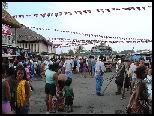 Oswald drove and half an hour later we arrived. We weren’t actually at the beach yet, but were just at the pre-beach area. This consisted of an enormous dirt field used for a parking area. We left the bus there and followed Oswald, Alex and Astrid back to the road and down toward a harbory-looking area. The road itself was crowded with people, most of whom were leaving for the day. There were plenty of other folks standing around, though, and we seemed to be of interest to many of them. Not surprising, I suppose, as we were the only Gringos in sight and pretty much stood out from the crowd.
Oswald drove and half an hour later we arrived. We weren’t actually at the beach yet, but were just at the pre-beach area. This consisted of an enormous dirt field used for a parking area. We left the bus there and followed Oswald, Alex and Astrid back to the road and down toward a harbory-looking area. The road itself was crowded with people, most of whom were leaving for the day. There were plenty of other folks standing around, though, and we seemed to be of interest to many of them. Not surprising, I suppose, as we were the only Gringos in sight and pretty much stood out from the crowd.After our adventures in Antigua yesterday, I found myself wondering what the pickpocket population was like around here. Or even the guys who beat you up and take your stuff population. I was already feeling foolish for having brought my backpack when all I really needed was a towel, some water and maybe my camera. I was just imagining the problems having brought this thing was going to cause once we got to the beach itself. Someone would have to stay behind to guard all our stuff while the rest of us went in the water.
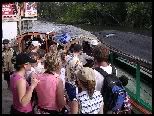 We weren’t even to the beach yet, though. In fact, you couldn’t really get to the beach by foot. We found that out when we arrived at a small muddy dock area where a number of small green and red ferry boats waited. Here you could pay the ferrymen to take you across a small inlet of the sea to a barrier island where the beach actually was. We had just enough room to get our entire party onto one of the ferry boats and we then set off across the inlet. My inner environmentalist was distressed to see that the water of the inlet was filled with floating plastic bottles and other garbage, much of which had washed up on the shoreline. It was just another reminder that we weren’t in Kansas any more.
We weren’t even to the beach yet, though. In fact, you couldn’t really get to the beach by foot. We found that out when we arrived at a small muddy dock area where a number of small green and red ferry boats waited. Here you could pay the ferrymen to take you across a small inlet of the sea to a barrier island where the beach actually was. We had just enough room to get our entire party onto one of the ferry boats and we then set off across the inlet. My inner environmentalist was distressed to see that the water of the inlet was filled with floating plastic bottles and other garbage, much of which had washed up on the shoreline. It was just another reminder that we weren’t in Kansas any more.On the other side of the inlet we still had a ways to go before reaching the beach. A path lead from the shore of the inlet and became a covered aisle between a cluster of low buildings crowded with more people. Most of these buildings were nothing more than roofed off sections of dirt where people had set up cocinas selling food and some with tables selling goods such as clothing, towels, trinkets and souvenirs. These all had a roadside stand unofficial feel to them that I don’t think most Americans are accustomed to. (I, like most Gringos, am suspicious of anything that doesn’t come with a factory-sealed wrapper and colorful label. I’m not saying this is right, I’m just saying it is the case.)
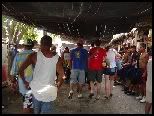 As we made our way through the aisle, it became increasingly difficult to keep up with one another. I was still limping from my earlier injury, but I was trying my best to keep up with Andrew and Alex who were just ahead of me. At the same time, there were several young ladies in our group who were behind me and who I felt responsible for keeping an eye on as well. We may have been in no danger whatsoever, but I didn’t like the looks we were getting from some of the kids and men standing on the edges of this narrow aisle and I wanted to make sure we made it to the beach and back with all of our group.
As we made our way through the aisle, it became increasingly difficult to keep up with one another. I was still limping from my earlier injury, but I was trying my best to keep up with Andrew and Alex who were just ahead of me. At the same time, there were several young ladies in our group who were behind me and who I felt responsible for keeping an eye on as well. We may have been in no danger whatsoever, but I didn’t like the looks we were getting from some of the kids and men standing on the edges of this narrow aisle and I wanted to make sure we made it to the beach and back with all of our group.About mid-way through this crowded aisle was a dance club. I say dance club, because that’s the nearest description I can come up with. What it really was was another roofed off area with a dirt floor, very loud dance music and, I think, a glitter ball. The music was extremely loud, though and I suddenly realized I was very very hot. How could people dance in this weather? The aisle also seemed to narrow near the entrance to the club, forcing us all to squish together a bit tighter with the strangers around us.
Then, as I watched, one of the men standing on the sides detached himself from his position and squeezed up beside Andrew, just ahead of me. The man reached out his right arm and slipped it around Andrew’s waist. At first I thought he was going for Andrew’s wallet, but he made no such move for any pocket. Instead, his arm just rested there on Andrew’s back. Now, the thing you have to know about Andrew is that he’s in the Air Force and is not a weak or small individual. He’s not a person who’s prone to fighting, but I have no doubt he could handle himself in one. As Andrew explained to me later, though, at that moment he wasn’t so much concerned about the man with his arm around him as he was about how many friends that man might have nearby. Not a bad thing to be wondering about, considering our circumstances. He therefore didn’t really want to piss this guy off but at the same time he wasn’t putting up with unwelcome personal contact. So Andrew gave him a hard shoulder, avoided eye contact and continued walking. I saw this and became immediately concerned that maybe we shouldn’t have come to the beach after all. I mean, how many movies set in foreign lands have scenes like this occur just before the ninja’s show up and kill everyone?
The next thing I knew, Alex was at Andrew’s other side and put his own arm around Andrew, pulling him away from the stranger while at the same time giving the stranger a serious stink-eye. The stranger fell back and we all passed beyond the dance club and on to the beach.
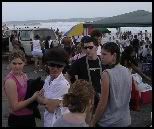 I’m not precisely sure what I expected from the beach, but the sea of garbage we found wasn't quite it. I don’t suppose I should have been surprised at the amount of trash present, because we'd certainly seen a lot already on our way there, in the inlet water and in the aisle. The beach itself was far worse. There were empty bottles, both plastic and glass, old styrofoam cups, sunscreen bottles and food wrappers simply everywhere atop and beneath the black sand beach. My inner environmentalist was screaming in terror as I took in this sight. And while there were several trash receptacles to be found, they were not spilling over with trash. In fact, no one seemed to have noticed them at all.
I’m not precisely sure what I expected from the beach, but the sea of garbage we found wasn't quite it. I don’t suppose I should have been surprised at the amount of trash present, because we'd certainly seen a lot already on our way there, in the inlet water and in the aisle. The beach itself was far worse. There were empty bottles, both plastic and glass, old styrofoam cups, sunscreen bottles and food wrappers simply everywhere atop and beneath the black sand beach. My inner environmentalist was screaming in terror as I took in this sight. And while there were several trash receptacles to be found, they were not spilling over with trash. In fact, no one seemed to have noticed them at all.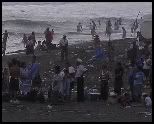 I stood there, feeling bewildered. I'm sure you can find filthy beaches in America too, but I've never been to one where the trash was so completely out of control. I just kept thinking "How?" over and over. I felt overwhelmed by it all, not only the trash but also the fear I'd experienced in the aisle on our way in. I think Andrew felt this way too because he asked me if I’d seen the strange man who had put his arm around Andrew back in the aisle. I told him I had. Andrew said it was an experience that had raised his hackles that his fight or flight instinct had been definitely activated by it. We had no idea what the guy wanted or why he had done that, but we couldn't conceive of it being an innocent move.
I stood there, feeling bewildered. I'm sure you can find filthy beaches in America too, but I've never been to one where the trash was so completely out of control. I just kept thinking "How?" over and over. I felt overwhelmed by it all, not only the trash but also the fear I'd experienced in the aisle on our way in. I think Andrew felt this way too because he asked me if I’d seen the strange man who had put his arm around Andrew back in the aisle. I told him I had. Andrew said it was an experience that had raised his hackles that his fight or flight instinct had been definitely activated by it. We had no idea what the guy wanted or why he had done that, but we couldn't conceive of it being an innocent move.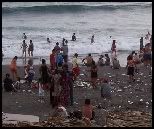 At that point, our beach-going experience didn’t seem like it was panning out to be a good one. Then Astrid came over to us and told everyone to follow her. She led us over to a kind of restaurant/bar that fronted a kind of beach-side motel. In the courtyard of this motel, there was a set of rail-less curving concrete steps (with more dangerously exposed rebar) that led up to the second floor area for the bar. It was a palm-frond roofed structure with lots of bamboo and more plastic tables and chairs. There were a few customers hanging out at the tables there, but mostly the place was empty enough that we could use it as a base of operations. It did offer a fantastic view of the Pacific and a less fantastic one of the filthy beach below. From our new perch, the scene below now looked far more like any typical American beach at Spring Break. We could then
At that point, our beach-going experience didn’t seem like it was panning out to be a good one. Then Astrid came over to us and told everyone to follow her. She led us over to a kind of restaurant/bar that fronted a kind of beach-side motel. In the courtyard of this motel, there was a set of rail-less curving concrete steps (with more dangerously exposed rebar) that led up to the second floor area for the bar. It was a palm-frond roofed structure with lots of bamboo and more plastic tables and chairs. There were a few customers hanging out at the tables there, but mostly the place was empty enough that we could use it as a base of operations. It did offer a fantastic view of the Pacific and a less fantastic one of the filthy beach below. From our new perch, the scene below now looked far more like any typical American beach at Spring Break. We could then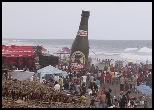 see some of the usual beach-scene items, like giant inflatable beer bottles and portable canopies and umbrellas. It no longer seemed quite as sinister as it had when we were down in it earlier, shaking off the tremors from our experience in the aisle. Now it just looked like a filthy beach full of people who were there to have a good time. Since a few of our crew said they would stay behind and guard everyone's stuff, we figured we'd join the beach-goers and head for the water too.
see some of the usual beach-scene items, like giant inflatable beer bottles and portable canopies and umbrellas. It no longer seemed quite as sinister as it had when we were down in it earlier, shaking off the tremors from our experience in the aisle. Now it just looked like a filthy beach full of people who were there to have a good time. Since a few of our crew said they would stay behind and guard everyone's stuff, we figured we'd join the beach-goers and head for the water too.We walked along the shore, moving down the beach away from the crowds, who were mostly gathered near the aisle to the ferries, and eventually we walked out of the fields of garbage and onto a far less crowded stretch of black sand beach. From there we hit the water proper.
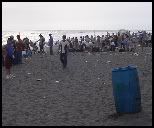 I’d not been in the Pacific in a very long time. In fact, I can’t even remember the last time, I was so young. However, I figure that having been born in California and having spent a year in Guam, it’s pretty likely that at some point my parents plunked me in the Pacific drink. We’d been warned before coming here that the water would be rough and it certainly was. I’m far more used to the Atlantic beaches along the North Carolina coast, but this one had waves that didn’t play around. They weren’t exactly huge waves but they packed a wallop that could surprise you. One of my favorite things to do is to try and stand still and let a wave wash over me, remaining as steady as I can against it. Not with these waves, I didn’t. These waves would smash into you, dunk you under, rub your face in the sand a bit and then spit on you. It’s kind of a rush, though, to be at the mercy of nature in that way, though.
I’d not been in the Pacific in a very long time. In fact, I can’t even remember the last time, I was so young. However, I figure that having been born in California and having spent a year in Guam, it’s pretty likely that at some point my parents plunked me in the Pacific drink. We’d been warned before coming here that the water would be rough and it certainly was. I’m far more used to the Atlantic beaches along the North Carolina coast, but this one had waves that didn’t play around. They weren’t exactly huge waves but they packed a wallop that could surprise you. One of my favorite things to do is to try and stand still and let a wave wash over me, remaining as steady as I can against it. Not with these waves, I didn’t. These waves would smash into you, dunk you under, rub your face in the sand a bit and then spit on you. It’s kind of a rush, though, to be at the mercy of nature in that way, though.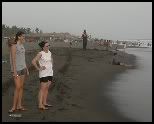 At one point, I got a bit further out than was probably wise and found myself treading water. Not usually a big concern for me, but I was having difficulty returning to the shore, and I’m a pretty good swimmer. I was expending a great deal more energy in trying to return to the shore than I was getting good results from. I was afraid I might be caught in a rip current and if so I knew I would need to swim along the shoreline until I broke free of it. (Watching the geek channels pays off, kids!) If I was in a rip-current, I don’t think it was a very one, at least only as far out as I was. It didn’t take very long at all for me to come out of it and get closer to shore.
At one point, I got a bit further out than was probably wise and found myself treading water. Not usually a big concern for me, but I was having difficulty returning to the shore, and I’m a pretty good swimmer. I was expending a great deal more energy in trying to return to the shore than I was getting good results from. I was afraid I might be caught in a rip current and if so I knew I would need to swim along the shoreline until I broke free of it. (Watching the geek channels pays off, kids!) If I was in a rip-current, I don’t think it was a very one, at least only as far out as I was. It didn’t take very long at all for me to come out of it and get closer to shore.We stayed in the water body surfing and having a great time. I was glad the beach had turned out to be a not entirely scary experience. After about 45 minutes, Astrid called us all out to leave. Once we were out on the beach, we saw that Jenna was still in the water and was farther out than looked safe, caught in the riptide. Andrew rushed in to help her while the rest of us prayed. I think it turned out, though, that she wasn’t so much caught in a riptide as she just hadn’t heard Astrid calling us out.
Back at the beachside motel, we showered the black sand off of us, as best we could, and gathered up our things to leave. I had brought a bottle of water in my backpack, so I took it over to the edge of the second story and leaned on the bamboo railing while I drank. I looked out on the water for what I figured would be the final time. Then, just as I'd finished almost all of my water, the bottle slipped through my fingers, bounced of the railing and disappeared over the side. My immediate impulse was to go down and get it and throw it away, but as I looked over the side to see where it fell I found I couldn't tell which of the 100 odd bottles already on the beach below was mine. I was amused and horrified at the same time.
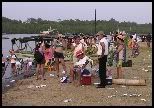 Instead of going directly back to the aisle’s entrance to make our exit, we took an alternate route through the back “courtyard” of the motel. There were families grilling out there, very much in vacation mode. Our route came out onto a back avenue that eventually intersected with the aisle. Once on the aisle we tried to keep in much closer contact with one another, particularly while passing the dance club again. The strange man from before didn’t approach us a second time.
Instead of going directly back to the aisle’s entrance to make our exit, we took an alternate route through the back “courtyard” of the motel. There were families grilling out there, very much in vacation mode. Our route came out onto a back avenue that eventually intersected with the aisle. Once on the aisle we tried to keep in much closer contact with one another, particularly while passing the dance club again. The strange man from before didn’t approach us a second time.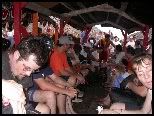 As we cast off in our ferry to go back across the inlet, I noticed that the gentleman seated next to me, a fellow Gringo by the looks of him, was NOT a part of our mission team. I think he had just snuck aboard, realizing that the ride was paid for and that he would at least not stand out to local eyes among us. I didn’t speak to him, but he looked a bit nervous about the whole thing.
As we cast off in our ferry to go back across the inlet, I noticed that the gentleman seated next to me, a fellow Gringo by the looks of him, was NOT a part of our mission team. I think he had just snuck aboard, realizing that the ride was paid for and that he would at least not stand out to local eyes among us. I didn’t speak to him, but he looked a bit nervous about the whole thing.Once on the other side, we continued to try and stick together as we passed back along the street and toward the parking lot. As I walked, two of the girls in our group dashed up and took hold of my backpack and asked if it was okay if they followed along with me. They said that two young men from the crowd near the ferries had shouted something at them in Spanish and then had begun following them. I told them they could walk in front of me if they wanted, but when they looked back the men had dropped their pursuit.
That night, after supper, we held a benefit auction for future Word of Life campers. As Marcello explained to us, it costs around $35 American money to send a child to camp for a week at Word of Life. So the items we were auctioning would go toward that goal. We had been told in advance of the trip that this would occur, so some of the team members had actually brought items to auction, such as was the case with a number of items of jewelry—some specifically made for this auction. Other team members just took advantage of what we had on hand to auction. For instance, Ashley had brought a barely used tube of body lotion, which she auctioneered herself and raised $35. The rest of the time Rick Brooks was our auctioneer.
As you can imagine, with an oral surgeon and a number of doctors as bidders, some of the items went for quite a bit of money. In most cases, the items weren’t worth nearly the amount paid for them, but that wasn’t the point of the auction in the first place.
I wound up buying a bar of Irish Spring soap for $35. I’d actually had my eye on it already and was willing to pay the $35 for it before the bidding even began. When it came up for auction, Alex, Oswald and some of the other missionaries began screaming “Eriiic, Eriiiic!” and then holding up their water bottles to represent the fake Woolite bottle from my story the night before, indicating that I really needed some soap. I went along with it and made the winning bid for $35. Unfortunately, I was not paying attention to what Rick was doing and looked away in Alex and Oswald’s direction for a moment, so I didn’t see Rick hurl the box of soap at me. Just as I turned back around, the box hit me in the side of the face, actually glancing off the bone just to the side of my eye socket. To everyone else, it looked like the box had hit me right in the eye. I played it up, wobbling my head and saying, “Hey, I didn’t need that eye.” Rick was mortified that he might have injured me, but I told him I was fine. Still, it was another close call in a day full of close call wounds.
The auction wound up raising $1686, which will send a total of 48 kids to camp there.
We wrapped up our evening around 10 p.m., as we knew we would all need to be up early in the morning to head out to the airport. Most of the team would be flying back to the United States, leaving Dr. Allen, Mary Ann, Andrew, Flo, Butch, Ashley and I to head over to El Salvador the following week. We knew Sunday was going to be a long day, but we had no clue at that point how difficult it was going to be for us.
Friday, March 25, 2005
DATELINE: Friday, March 25, 2005
UNLAXATION DAY 1
I wanted to sleep all the way `til 9, but found myself wide awake at 7:30. I don’t know if I was just restless or if I was just too cold from the double blast of air-conditioning, but I was awake. It had actually been quite blissful to sleep so cold, but after a few hours my body had cooled down and I was forced to retreat beneath the thin blanket I’d been using as stuffing for my pillow-case. So at 7:30 I got up and grabbed my camera and headed outside to see if I could find cool stuff to take pictures of.
I decided I needed a photographic mission for the morning and that mission was to photograph a snake. So far on the journey, we’d seen a few hefty bugs and one of the guys said he’d even seen a little scorpion in one of the bano stalls, but so far I’d not seen anything fangy and dangerous. I thought it would be great to find a picture of a snake, if only to show the image to my ophiciophobic wife, (that means "skeered of snakes", for those of us in West Virginia). Ash had been a bit worried about snakes throughout our trip. Someone had told her that the most deadly snake in the country is a tiny little snake that likes to hide under leaves and brush and then viciously bite anyone who accidentally steps on it. Most of the camp was red dirt, though, so we weren't too worried about leaves.
I walked from my bunk-house onto a clear path that ran through the rocks and shrubs on the side of the tallest hill at the camp. I kept my eyes peeled for snakes, figuring if they were on the path I'd see them. After more walking I found that my path indeed began to run underneath a long stretch of leaves and brush. I was wearing shorts and flip-flops--not exactly snake-proof gear--but I still didn’t want to wuss out and turn back. So I began carefully making my way through the leaves, trying to step on as many rocks as possible. When I was in the very middle of the leaf section, some birds that had been hiding in a nearby bush suddenly flushed out, frightening me nigh unto requiring a clean pair of drawers. Still no snake.
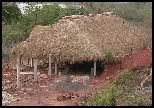 The path eventually lead down the hill onto a dirt road that ran back toward an open-air structure with a palm-frond roof as well as a second site that was only a foundation for a similar structure. We were to learn later that this will be the new dining hall and kitchen for the camp. The camp itself will be used primarily as a summer-camp for kids and several more bunk-houses and shower facilities will soon be built to help accommodate more kids, in addition to the new kitchen and dining hall. This place is impressive enough now, but it’s going to be even better once Marcello has a few more buildings.
The path eventually lead down the hill onto a dirt road that ran back toward an open-air structure with a palm-frond roof as well as a second site that was only a foundation for a similar structure. We were to learn later that this will be the new dining hall and kitchen for the camp. The camp itself will be used primarily as a summer-camp for kids and several more bunk-houses and shower facilities will soon be built to help accommodate more kids, in addition to the new kitchen and dining hall. This place is impressive enough now, but it’s going to be even better once Marcello has a few more buildings.Dr. Allen was up for a morning stroll and he and I walked along the dirt road that curved around the bottom of the biggest hill chatting about our week. I like Dr. Allen and Mary Ann a whole lot. Ashley had done two medical rotations at Dr. Allen's clinic--her first one and her third from last, which she was technically continuing on this mission. She had been saying how great to work with he and Mary Ann were for months, but I'd not met either of them until we attended the wedding of his daughter in February. I was glad to have gotten to know them both on this mission. And I haven't written nearly enough about how great Mary Ann was in the pharmacy. We sometimes get under each others feet, and I've no doubt that our methods often clash, but in such cases I always tried to remember that between the two of us she is far far far more likely to know what she's talking about, being a nurse and all, so I should always defer to her judgement
We continued along the road until it intersected with a very steep road that lead to the top of the hill. We parted ways there, for due to his bad knees he wasn’t keen on walking up that hill just yet.
 Near the top of the hill were rows and rows of logs that had been laid down to provide seating for a massive campfire pit. This is where future campers would settle at the end of their day to sing around the campfire. Further up from there at the actual top of the hill I could see a fantastic view of the entire camp property. After gazing around at the lake and surrounding camp buildings below me, I went to take a look at the zip-line.
Near the top of the hill were rows and rows of logs that had been laid down to provide seating for a massive campfire pit. This is where future campers would settle at the end of their day to sing around the campfire. Further up from there at the actual top of the hill I could see a fantastic view of the entire camp property. After gazing around at the lake and surrounding camp buildings below me, I went to take a look at the zip-line.The zip-line was a thick metal cable that was stretched between a large concrete anchor on that hill to another one on the next hill over. This was a device that would allow a fully harnessed up person to "zip" along the wire on pulleys, high above the ground, moving from one hill to the other very quickly. The pulleys and rigs weren’t attached yet, but we’d been told we’d be able to play on the zip-line on Saturday. The line itself was pretty far above the ground, but I was already looking forward to trying it out.
I took a few pictures of the camp up there, but I never found a snake.
I ate breakfast with Esdras that morning, talking more about his education plans and his concerns about seminary. Mid-way through our chat, there came a tremendous crie from the far side of the dining pavillion. A group of the translators and missionaries were hoisting the youngest member of the mission/translator staff, Kevin Herrera, over their shoulders and into the air.
I haven't written about Kevin before because our paths didn't cross a lot during the course of our mission work. However, he was kind of the adopted mascott of camp. Kevin was probably 14 years old, but a fairly fluent English speaker. He was a very outgoing kid, always smiling, always happy and often playing practical jokes on anyone and everyone. During one day in Pasaco, Kevin offered me a piece of chewing gum. I chewed it to find that it was packed full of some kind of intense flavor crystals that made it at least twice as powerful as an Altoid mint. Kevin was expecting some sort of extreme reaction from me and was very disappointed when I turned out to like the gum.
"Where did you get it?" I asked.
"Oh, the store," he said.
"What's it called again? I've got to get some of that to take home."
He later tried the same trick on Ashley, with very similar results. Other team members, however, weren't so immune to the powerful gum and Kevin became known as a trickster.
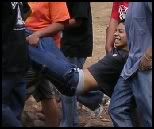 I still don't know what Kevin did to provoke his fellow translators and missionaries, but it must have been something worthy of collective revenge. We watched watched as the group of locals hoisted Kevin above their heads then lowered him to carry by each of his limbs as they took him away from the pavillion and down the hill. This could only mean one thing: Kev was getting dumped in the lake.
I still don't know what Kevin did to provoke his fellow translators and missionaries, but it must have been something worthy of collective revenge. We watched watched as the group of locals hoisted Kevin above their heads then lowered him to carry by each of his limbs as they took him away from the pavillion and down the hill. This could only mean one thing: Kev was getting dumped in the lake.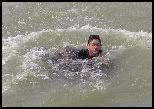 Esdras and I shot up from our seats and ran to follow. I ran down the hill, trying to get my camera out of its bag and trying not to collide with Andrew, who was also sprinting through the rocks and brush trying to get ahead of the Kevin-carrying revenge squad. I'm amazed we didn't break something vital in our dash down the hill, but we did get ahead of them. They carried Kevin down onto the small dock, thoughtfully removed his shoes for him, then heaved him back and forth a few times and then let him fly. Kevin splashed down in the four foot deep water. He came up grinning, but soon started splashing everyone on the dock with the now muddy water. His tormentors, satisfied that they had meted out justice for the day, retreated back to their breakfasts leaving the rest of us to stay around and take pictures of the soaked lad. The lake bottom is nothing but mud and silt, so Kevin's formerly white socks were now deep black.
Esdras and I shot up from our seats and ran to follow. I ran down the hill, trying to get my camera out of its bag and trying not to collide with Andrew, who was also sprinting through the rocks and brush trying to get ahead of the Kevin-carrying revenge squad. I'm amazed we didn't break something vital in our dash down the hill, but we did get ahead of them. They carried Kevin down onto the small dock, thoughtfully removed his shoes for him, then heaved him back and forth a few times and then let him fly. Kevin splashed down in the four foot deep water. He came up grinning, but soon started splashing everyone on the dock with the now muddy water. His tormentors, satisfied that they had meted out justice for the day, retreated back to their breakfasts leaving the rest of us to stay around and take pictures of the soaked lad. The lake bottom is nothing but mud and silt, so Kevin's formerly white socks were now deep black.After breakfast, we said our last goodbyes to the members of the local team who were departing for Guatemala City. Our departure wasn’t far behind.
Throughout the week, I had noticed a disturbing pattern with our medical team and with myself, which repeated itself Friday morning. Whenever it came time to go anywhere by bus, the whole lot of us would climb the hill at camp to where the busses were parked, board the busses and then sit in them sweating like pigs in a sauna as the last few stragglers finally made their way up the hill to board as well. We could have just waited outside, where it was still hot but not sauna hot. But noooo, every single time we all climbed on the bus and sweated and muttered about the slow people holding us up and how we wished we could get on the road so we could get some wind on us and how next time we should just wait outside. Every. Single. Time. And medical personnel are supposed to be smart.
Our trip to Antigua was in the full-sized bus, the one with all of its seats, but there was still not enough room for everyone. (We found this out only after everyone had piled on the hot bus like morons YET AGAIN. What is it about such hot weather that makes otherwise intelligent people, myself included, pile into a giant tin can in 120 degree heat, repeatedly?) In order to create more seating, one of the pavilion benches was brought in and slid down the bus aisle. It was a tight fit for everyone.
Ashley nearly stayed behind for the day, because she was feeling ill and the heat was really getting to her. Once the bus was under way, though, the air-circulation cooled us off quite a bit and she began to feel better.
Most of the team had changed out around $50 in U.S. currency for the equivalent in quetzals, the Guatemalan currency. Due to an exchange rate of about 7 quetzals for every dollar, we felt like truly wealthy people. Unfortunately, Antigua is not only famous for it’s Holy Week festivities but also for its pickpockets. We were also warned to keep all wallets and important papers in front pockets and to keep a sharp eye out for trouble and not to leave anything on the bus, because thieves were likely to come onto the bus while we were gone.
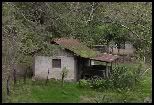 The drive to Antigua was nearly as long than that back to Guatemala City. Antigua is to the south-west of G-City. We were therefore able to skirt around G-City and on into Antigua.
The drive to Antigua was nearly as long than that back to Guatemala City. Antigua is to the south-west of G-City. We were therefore able to skirt around G-City and on into Antigua.Oswald drove us. Every time he got behind the wheel, he proved to us just how fantastic a driver he is. Driving a school bus in Central America isn’t as easy as in the states. Most of the streets in these smaller towns are very narrow and difficult to maneuver in a car, let alone a big white bus. Even when hurtling the wrong way down one-way streets with lots of tight corners, Oswald had it under control.
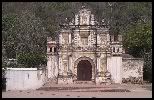 We didn’t have nearly as much trouble getting into Antigua as had been predicted. We were able to drive right up to the edge of the down town proper, passing fantastic ancient churches and ruins along the way. There was a line of parked busses that we had to go by in order to get to the edge of the down-town area. Once there, Oswald stopped to let us out, the plan being for him to find a place to park the bus and catch up with us later. Rick and Butch told us that we would soon be splitting into smaller groups each with a translator, but first there were a couple of places of interest that they wanted to show us. After that, we were free to go.
We didn’t have nearly as much trouble getting into Antigua as had been predicted. We were able to drive right up to the edge of the down town proper, passing fantastic ancient churches and ruins along the way. There was a line of parked busses that we had to go by in order to get to the edge of the down-town area. Once there, Oswald stopped to let us out, the plan being for him to find a place to park the bus and catch up with us later. Rick and Butch told us that we would soon be splitting into smaller groups each with a translator, but first there were a couple of places of interest that they wanted to show us. After that, we were free to go.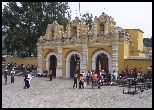 The first thing I need to say about Antigua--the first thing we really noticed upon departing our bus--is that the climate was FANTASTIC! It was still warm, of course, but probably in the low to mid-80s. It was also not at all humid and there was a constant light breeze blowing that made it perfectly comfortable. I'd somehow been expecting a sweat-fest, but should have known that since we had returned to higher elevation it would be nice. This comfort put us all in great spirits and got the unlaxation off to a proper start.
The first thing I need to say about Antigua--the first thing we really noticed upon departing our bus--is that the climate was FANTASTIC! It was still warm, of course, but probably in the low to mid-80s. It was also not at all humid and there was a constant light breeze blowing that made it perfectly comfortable. I'd somehow been expecting a sweat-fest, but should have known that since we had returned to higher elevation it would be nice. This comfort put us all in great spirits and got the unlaxation off to a proper start.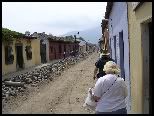 We walked down from the bus into the town itself, following Butch, where we soon found ourselves hanging a left onto an unpaved street. The street looked as though its paving had been dug up at some point in the recent past in preparation for repaving. As a result, the narrow sidewalks were often over a foot and a half above the street itself.
We walked down from the bus into the town itself, following Butch, where we soon found ourselves hanging a left onto an unpaved street. The street looked as though its paving had been dug up at some point in the recent past in preparation for repaving. As a result, the narrow sidewalks were often over a foot and a half above the street itself.Our first stop of interest was a beautiful hotel. To enter it you had to cut through a cluster of street-peddlers who were camped out at its entrance awaiting the tourists who came and went. They attempted to sell us beads, trinkets, reed flutes and tapestries until we were able to get through them and into the hotel. Once inside, we found ourselves on a wide stone walk that ran along a lush and fountain-studded open air garden that lead to the hotel's mostly open air lobby. When I say mostly open air, I mean that the front desk, while covered by a roof, was still exposed to the air from the open garden that it bordered. The desk itself was an ancient-looking carved wood structure that most of us deemed "awesome" in true American fashion.
We walked through the garden, taking photos of each other with the enormous parrots that hung from perches there, or with the various art exhibits on display.
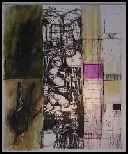 Further past the lobby was an alcove art gallery with some of the most disturbing art I've seen in a while. I only took pictures of one of them because I was a little scared of seeing any more of them pop up during one of Butch's slide shows. I was not as afraid of some of the sculpture on display in the lobby, though. Across from the alcove was a lovely restaurant that had both a covered area and an outdoor patio area side by side. We went out to the patio area that was not a part of the restaurant itself and walked around enjoying the atmosphere and looking at the wares of the ladies who were
Further past the lobby was an alcove art gallery with some of the most disturbing art I've seen in a while. I only took pictures of one of them because I was a little scared of seeing any more of them pop up during one of Butch's slide shows. I was not as afraid of some of the sculpture on display in the lobby, though. Across from the alcove was a lovely restaurant that had both a covered area and an outdoor patio area side by side. We went out to the patio area that was not a part of the restaurant itself and walked around enjoying the atmosphere and looking at the wares of the ladies who were 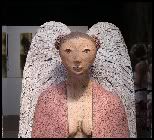 selling Guatemalan souvenirs. They had some marvelous things, such as knitted hats and bags, jewelry, masks and crafts of all sorts, plus the standard assortment of beads, trinkets, reed flutes and tapestries. As we looked, though, some of our interpreters came up and slyly told us not to buy anything there because the prices were quite inflated compared to the Indian Markets further into Antigua itself. We kept our quetzals in our pockets.
selling Guatemalan souvenirs. They had some marvelous things, such as knitted hats and bags, jewelry, masks and crafts of all sorts, plus the standard assortment of beads, trinkets, reed flutes and tapestries. As we looked, though, some of our interpreters came up and slyly told us not to buy anything there because the prices were quite inflated compared to the Indian Markets further into Antigua itself. We kept our quetzals in our pockets.After a lengthy headcount to make sure we were all still there, we back out to the street where we practically had to fight our way through the peddlers gathered at the entrance with their beads, trinkets, reed flutes and tapestries. We then followed missionary extraordinaire Marcello Hounko (no relation to Marcello Diez) as he lead us back along the unpaved street and a few blocks further into the city. As we went, more peddlers came up with more beads, trinkets, reed flutes and tapestries but I think we all steadfastly refused.
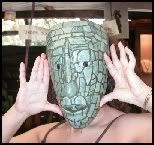 Marcello H. led us to a genuine Guatemalan Jade factory, which turns out to be one of the only officially sanctioned ones in that part of the world. The factory is where mined jade is brought and shaped with diamond instruments and grinders, fashioned into a wide variety of objects that are then shipped around the world. The factory itself was not in operation that day due to the holidays but we were given a tour of the area and shown some beautiful examples of the kind of thing they do there and told a bit of the history of Jade itself in Central America.
Marcello H. led us to a genuine Guatemalan Jade factory, which turns out to be one of the only officially sanctioned ones in that part of the world. The factory is where mined jade is brought and shaped with diamond instruments and grinders, fashioned into a wide variety of objects that are then shipped around the world. The factory itself was not in operation that day due to the holidays but we were given a tour of the area and shown some beautiful examples of the kind of thing they do there and told a bit of the history of Jade itself in Central America.After the tour, we retired to the gift shop where we were served complimentary locally grown coffee in little stoneware cups that we could keep. They also gave us little knitted rainbow colored drawstring pouches on a string necklace that contained a small doll. This is a traditional Guatemalan gift to bring good luck. I went ahead and put mine on. I didn't know it at the time, but the pouch, if not the doll within, would become my dearest friend in the coming days.
Upon leaving the Jade factory, we were set free to do what we wanted. It was around 3:30 at that point, so we agreed to meet back at the bus area at 5:30. Beyond that we could go off on our own or in groups and there were enough translators to go around for small groups. Ash and I decided it would best to stick close to a group of folks, so we tagged along with a few people to explore the ancient streets. We had to keep repeating the phrase "No gracias!" over and over as wave upon wave of more peddlars came at us.
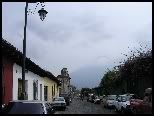 The streets and architecture of Antigua were amazing to see, particularly with the volcano jutting up from the horizon, looming over us despite being quite a distance away. I don't think I've ever been to some place with such ancient structures. Probably the closest I've come was St. Augustine, FL, the oldest city in America (take THAT Boston!).
The streets and architecture of Antigua were amazing to see, particularly with the volcano jutting up from the horizon, looming over us despite being quite a distance away. I don't think I've ever been to some place with such ancient structures. Probably the closest I've come was St. Augustine, FL, the oldest city in America (take THAT Boston!).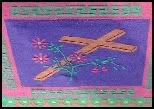 As you might expect at the pinnacle of Holy Week festivities, Antigua was quite crowded. No, really. There were just loads and loads and loads of people, beyond the peddlars. And not only Guatemalans but a wide variety of other nationalities as well. The Guatemalans themselves are a beautiful people, but there were some other incredible-looking people from all over the world there as well. As a writer, I found myself wondering about their backgrounds and reasons for coming to Antigua on this day, (though they were all probably pretty similar, considering the main draw was the holy week festivities).
As you might expect at the pinnacle of Holy Week festivities, Antigua was quite crowded. No, really. There were just loads and loads and loads of people, beyond the peddlars. And not only Guatemalans but a wide variety of other nationalities as well. The Guatemalans themselves are a beautiful people, but there were some other incredible-looking people from all over the world there as well. As a writer, I found myself wondering about their backgrounds and reasons for coming to Antigua on this day, (though they were all probably pretty similar, considering the main draw was the holy week festivities).Occasionally, we would see a shop we wanted to stop in and would do so. I was looking out for interesting masks, as I seem to have collected a few from around the world and thought it might be nice to pick one up. But it couldn't just be any mask. It had to be something that just jumped out and said, Oh, hey, I'm the mask for you. I didn't find it in the tiny mask shop we visited, though, so we moved on.
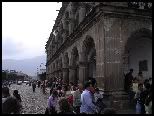 The street we were walking down eventually opened onto Antigua's main square, an enormous area surrounded by more ancient and beautiful buildings, with peddlers and rolling snack carts every few feet. There was more room to walk around here, but there were also more people to fill up that room. I found the experience kind of overwhelming to view. You couldn't look at everything and everyone, but there was so much going on around you that you wanted to look at. It kind of pressed emotional buttons within me, and I know it did with Ashley because she was tearing up too.
The street we were walking down eventually opened onto Antigua's main square, an enormous area surrounded by more ancient and beautiful buildings, with peddlers and rolling snack carts every few feet. There was more room to walk around here, but there were also more people to fill up that room. I found the experience kind of overwhelming to view. You couldn't look at everything and everyone, but there was so much going on around you that you wanted to look at. It kind of pressed emotional buttons within me, and I know it did with Ashley because she was tearing up too.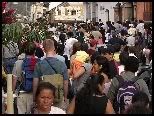 We continued along the street, leaving the square and traveling on. Our main road eventually intersected a four-lane road system that was lined with more snack carts and little temporary cocinas selling what smelled like tasty but potentially stomach-churning food. We looked things over there, but kept moving lest temptation to destroy our GI tract become too great.
We continued along the street, leaving the square and traveling on. Our main road eventually intersected a four-lane road system that was lined with more snack carts and little temporary cocinas selling what smelled like tasty but potentially stomach-churning food. We looked things over there, but kept moving lest temptation to destroy our GI tract become too great.Soon we came to a row of covered booth shops that sold all manner of souvenir items--mostly T-shirts, dresses, masks, hats, colorful knitted clothing, bright bags and the usual assortment of necklaces, trinkets and reed flutes. Some of our crew were already there shopping, including Dr. Allen and Mary Ann. Mary Ann had bought a bright red knitted bag and was transferring the contents of her pack into it. I noticed again that Dr. Allen was wearing his passport wallet on the outside of his clothing. This seemed a little unwise to me, as I thought those things were meant to be worn beneath your clothes or at least snugly in a pocket. My own I'd put in my velcro closed back pocket, but I'd already removed all of my money from it so that I didn't have to keep taking it out and calling attention to it. My theory was that pickpockets watch to see which pockets you keep checking and use that as a tell to which pockets they should pick.
We shopped a bit among the items being offered at the booth shops. The ladies that ran the shops didn't speak much English, but knew a few phrases which they repeated over and over. "Buy for Mama. Buy for my seester. Buy for Mama."
We didn't wind up buying anything at those shops, but the same rules applied at the Indian Market, which was only a little way further down the road.
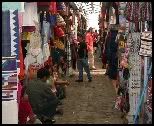 The Indian Market was a cluster of permanent cubbyhole shops, each of which were roofed but which had open air aisles between them, covered by a translucent roof above that. We only thought we'd had trouble with the street peddlers earlier, because a walk through the Indian Market meant a constant attack by aggressive salespeople who didn't want to accept "No Gracias" for an answer. We had been told by our translators to never pay the asking price for any given item because the shopkeepers expect you to haggle with them and are more than willing to give you a better deal if you do so. The rule of thumb was to try and pay no more than half of the original asking price. However, I found the best way to haggle was to pick up an item, decide you were truly uninterested in it and try to walk away. Then the shopkeepers couldn't lower their prices fast enough and would do all your haggling for you. We wound up purchasing things out of sheer shopper's guilt at passing up such terrific bargains. And the more disinterested you tried to act, the lower the price went. We didn't haggle so much as we succumbed to guilt over turning down such terrific bargains. This was, of course, their plan all along.
The Indian Market was a cluster of permanent cubbyhole shops, each of which were roofed but which had open air aisles between them, covered by a translucent roof above that. We only thought we'd had trouble with the street peddlers earlier, because a walk through the Indian Market meant a constant attack by aggressive salespeople who didn't want to accept "No Gracias" for an answer. We had been told by our translators to never pay the asking price for any given item because the shopkeepers expect you to haggle with them and are more than willing to give you a better deal if you do so. The rule of thumb was to try and pay no more than half of the original asking price. However, I found the best way to haggle was to pick up an item, decide you were truly uninterested in it and try to walk away. Then the shopkeepers couldn't lower their prices fast enough and would do all your haggling for you. We wound up purchasing things out of sheer shopper's guilt at passing up such terrific bargains. And the more disinterested you tried to act, the lower the price went. We didn't haggle so much as we succumbed to guilt over turning down such terrific bargains. This was, of course, their plan all along.We found some nice souvenirs to bring home to folks. I found five colorful sun-face ceramic ornaments for the library staff. I actually did try haggling over them, but when I did the calculations, hours later, I was really lowballing my bid and the shopkeeper that sold them to me had every reason to turn down my offer and stick to her guns. I still got away for a steal.
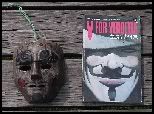 Ash found a pair of jade earrings at another shop and I finally found a wooden mask that I liked. At first, I thought it was because the mask looked very similar to the title character's Guy Fawkes mask in the Alan Moore/David Lloyd comic series V for Vendetta. Later, I realized it also looked quite a bit like me, with its thick eyebrows, goatee and rosy cheeks.
Ash found a pair of jade earrings at another shop and I finally found a wooden mask that I liked. At first, I thought it was because the mask looked very similar to the title character's Guy Fawkes mask in the Alan Moore/David Lloyd comic series V for Vendetta. Later, I realized it also looked quite a bit like me, with its thick eyebrows, goatee and rosy cheeks.It was 5:15 by the time we decided to head back toward the bus. We should have felt guilty for starting back so late, but we didn't worry about it as mission leader Rick Brooks was right there at the market with us and was therefore exactly as late as we were.
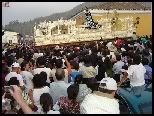 We started back down the road passing the previous shops and food vendors and on through the main square. We had nearly made it as far as the jade factory when foot traffic came to a sudden halt at an intersection. Passing through the intersection was the last of the Holy Week processionals. This is one of the major features of Holy Week in which citizens pay big money for the privilege of carrying elaborately carved and incredibly heavy "float" through the streets of the city. These floats depict different aspects of the death of Christ in traditional elaborate Catholic fashion. The float-carriers themselves are elaborately garbed as well and take the float in shifts winding throughout the streets of Antigua.
We started back down the road passing the previous shops and food vendors and on through the main square. We had nearly made it as far as the jade factory when foot traffic came to a sudden halt at an intersection. Passing through the intersection was the last of the Holy Week processionals. This is one of the major features of Holy Week in which citizens pay big money for the privilege of carrying elaborately carved and incredibly heavy "float" through the streets of the city. These floats depict different aspects of the death of Christ in traditional elaborate Catholic fashion. The float-carriers themselves are elaborately garbed as well and take the float in shifts winding throughout the streets of Antigua.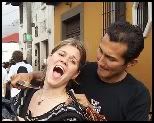 If we had been just a little bit quicker, we probably could have made it through the intersection. Instead, everyone stopped and watched as floats depicting the burial and resurrection of Christ were carried through. Soon, all the foot traffic that had been behind us reached the place where we stood and the group of us suddenly found ourselves squished up against one another and against the other members of the crowd in a most tight fashion. This was when my paranoia went into overdrive, because it was an atmosphere in which I imagined pickpockets would be lurking. I shouldn't really have worried about pickpockets in the standing crowd, though, because no one could really move anyway. But after 10 minutes or so, the slow procession had passed by and foot traffic began moving again and suddenly we found ourselves in chaos.
If we had been just a little bit quicker, we probably could have made it through the intersection. Instead, everyone stopped and watched as floats depicting the burial and resurrection of Christ were carried through. Soon, all the foot traffic that had been behind us reached the place where we stood and the group of us suddenly found ourselves squished up against one another and against the other members of the crowd in a most tight fashion. This was when my paranoia went into overdrive, because it was an atmosphere in which I imagined pickpockets would be lurking. I shouldn't really have worried about pickpockets in the standing crowd, though, because no one could really move anyway. But after 10 minutes or so, the slow procession had passed by and foot traffic began moving again and suddenly we found ourselves in chaos.I likened it to being trapped in a busy high school hallway, jostled on every side by moving humanity all trying to go in opposing directions. I found myself trying to keep paths clear for the people around me, some of whom were elderly, while at the same time still trying to keep up with Ashley and the rest of the group. This, we believe, was when the pickpockets really struck, though none of us knew that anyone's pocket had been picked until we had walked all the way back to our rendezvous point.
"Do you have all of your belongings?" Astrid asked me as we waited for the bus to come.
"Yeah," I said, patting my back pocket where my passport wallet was. It was there.
"Are you sure?" she asked. "Have you checked everything?"
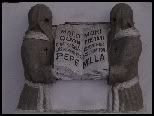 That's when I learned that some of us had not made it with all our things. Dr. Allen had arrived at the rendezvous point, looked down to check his passport wallet and found he only had its straps hanging around his neck. His passport, credit cards and a good supply of cash had been in it. Similarly, his wife Mary Ann found that the bottom of her new bag had been slashed, leaving a nice sized hole in it. She had been carrying Dr. Allen's PADA, which was now missing. Sandra Waddell soon noticed that her bag had been slashed and her wallet taken, though she did still have her passport. Everyone was then asked to check his or her personal items to make sure we still had everything.
That's when I learned that some of us had not made it with all our things. Dr. Allen had arrived at the rendezvous point, looked down to check his passport wallet and found he only had its straps hanging around his neck. His passport, credit cards and a good supply of cash had been in it. Similarly, his wife Mary Ann found that the bottom of her new bag had been slashed, leaving a nice sized hole in it. She had been carrying Dr. Allen's PADA, which was now missing. Sandra Waddell soon noticed that her bag had been slashed and her wallet taken, though she did still have her passport. Everyone was then asked to check his or her personal items to make sure we still had everything.I was kind of amazed that I did, being as how my cheap backpack has open pockets in the back and hangs low enough on my back that anyone could have looked in or even reached in and I would never have known. Granted, I only had Nutter Butters and a couple of camera wires in there, so maybe no one found anything they wanted.
Butch later told us that upon hearing of Dr. Allen's missing passport wallet, he started to say, "How could anyone be dumb enough to get their passport stolen," when he reached down and realized his PDA was also missing. It had been in a buttoned cargo pocket, but the thieves had seen no difficulties in gaining access.
In order for Dr. Allen to get his passport replaced, Butch knew they would have to file a police report as soon as possible, so he, Dr. Allen and Marcello Hounko went to the local police station to take care of that. The rest of us piled back on our bus to sit and take stock of our experience. Many of us were angry initially that thieves had done so well off of us. Some even said that they wished they'd been able to catch the thieves in mid-theft. Then, we thought about this a bit more and realized we were probably lucky that we had not caught them. These guys were carrying blades in order to slice open bags and pockets and would likely have had no problem slicing us open if it meant getting away.
When Dr. Allen returned, he said there had been a British couple at the police station ahead of him who had been beaten up by a gang of men weilding machettes who took their bags. We frankly got off lucky.
Dinner that night was to be at a restaurant in Guatemala City. We called Marcello Diez ahead to let him know we'd be a bit later than expected due to our adventures with pickpockets. Soon after Dr. Allen returned to the bus, we hit the road.
It took about an hour to get to Guatemala City, but our first stop was actually Marcello’s house. Once there, Marcello saw how cramped the bus was and made the enticing offer that some of the people who felt especially crammed could ride in his nice air-conditioned van instead and be more comfy. There were surprisingly few takers. In retrospect, maybe some of them knew something we didn’t. Ash and I decided that if no one else was scrambling to ride in comfort, we would. Dr. Allen and Mary Ann as well as a handful of others joined us in the van.
The trip to the restaurant was just blissful, with nice cool air-conditioning blowing on us the whole way.
 We dined that evening at a Sizzler steakhouse/buffet. I was frankly glad to see it, because you know what you're getting with a Sizzler and my stomach had been feeling a bit achey through the afternoon and I was pretty sure I wasn't yet shed of my gastronomic adventures of the past few days.
We dined that evening at a Sizzler steakhouse/buffet. I was frankly glad to see it, because you know what you're getting with a Sizzler and my stomach had been feeling a bit achey through the afternoon and I was pretty sure I wasn't yet shed of my gastronomic adventures of the past few days.Several of the missionary staff and national medical personnel who lived in Guatemala City joined us there for dinner and we had a great time. We were practically the only folks in the restaurant at that time of night. My stomach ache even decided to subside during dinner, allowing me to enjoy it. However, it roared back into life immediately afterward. I won’t be gross, but I got to know the Sizzler’s bano pretty well over the course of ten minutes. It receives my vote for Best Bano Ever, due to its comfort, privacy and good music.
After finishing our meal and saying goodbyes again to some of the staff we wouldn’t be returning to camp with, we loaded up. Once again, Ash and I rode in the van, which we figured would be the comfortable way to travel back into the humidity of the lower altitudes.
How wrong we were. How horrifically wrong we were.
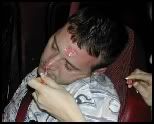 At first, things were quite nice. It was cool in the van and we kept ourselves amused by snickering quietly as Marcello's secretary defaced Butch with makeup as he snoozed in the front seat. (That's so wrong, I know, but it was funny.) It was so comfy in there that I eventually went to sleep myself.
At first, things were quite nice. It was cool in the van and we kept ourselves amused by snickering quietly as Marcello's secretary defaced Butch with makeup as he snoozed in the front seat. (That's so wrong, I know, but it was funny.) It was so comfy in there that I eventually went to sleep myself.I awoke probably 40 minutes later later in a thick sweat. At some point during the journey, Marcello had switched off the air-conditioner and it was never switched back on. Most of the windows on the van were of the variety that can only open a couple of inches and the one nearest me wouldn't stay open at all unless propped, so while we did get some air we didn’t get as much as the folks back on the bus likely were. That sounds bad enough. It might even sound like I’m complaining. No. I’m not. But I’m about to.
When I next awoke, I discovered the true reason why Marcello always tells people it will take far less time to get places than it actually does. And that reason is because you do indeed arrive at destinations far more quickly when you drive at 90 mph the entire way!
There I was, sleeping away. Then my heat-addled mind awakened me, I groggily unstuck myself from the vinyl seat-back and casually glanced out the window only to find our night-time surroundings hurtling past the van at a tremendous and most unsettling speed. Marcello was laying on the gas peddle with abandon. I couldn’t see the speedometer from my seat, but it had to be edging close to 144 kilometer/hour. There was very little other traffic on the road, but whenever we would come upon a car (rush upon some, I should say) Marcello would just zip around it and on we’d go, careening into the night. I was terrified to my core.
I really shouldn’t have been surprised, because I knew Marcello’s reputation from Ashley’s description of her terrifying journey down the side of a mountain when her mission team was leaving Quetzaltenanga, trying to get back to Guatemala City during the civil disturbances of 2003. From what I’d heard of that trip, Marcello’s current driving was actually pretty tame by comparison. And at least we weren’t flying down twisty winding one-lane mountain roads.
No one else in the van seemed too concerned by our speed. In fact, most of them seemed to be trying to sleep through it as best they could. Not a bad idea, I thought. At least if I was asleep and we died in a horrible fiery crash, I might not wake up for it at all. Plus, if we did crash at this speed, death was almost a certainty, for there were no seatbelts to be found in Marcello’s van. (At least, I never found any. In fact, working seatbelts were pretty thin on the ground for much of our stay and by our second week in Central America I'd eschewed them entirely in favor of pure faith.)
Before returning to blissful unconsciousness, I decided to hedge bets against firey death by praying to our Heavenly Father for safe travel for us and for Marcello’s driving skills to be strengthened. This would not be the last time I would have to pray for safe travel in the hands of Marcello and his van. I’m sure I was not alone in my prayers, either and I know I wasn’t the only one audibly thanking God when we finally did arrive safely back at camp.
I hit the showers as soon as I could and by the time I got out the bus had also arrived. Most of the people on it looked happy and undisturbed by their journey. They spoke of seeing lava shooting out of the top of an active volcano on their way back. I'd slept through that part, so I didn't get to see it. At least I was alive, though.
Thursday, March 24, 2005
DATELINE: Thursday, March 24, 2005
Boy, I did NOT want to get up Thursday morning. The three days of clinics had finally caught up to me and despite getting a good 8 hours of sleep I was quite unwilling to stir at 6 a.m. I made it til 6:15 before the chorus of unanswered travel alarms that get louder and more irritating the longer they go unanswered just wouldn't let me slumber any more. (Did everyone get together and agree to buy the same maddening travel alarm?)
Not even coffee at breakfast had much effect at waking me up. While at breakfast, I also discovered that the shirt I had worn—the allegedly fresh clean, though still slightly damp shirt from my wash the night before—was not in fact fresh nor was it clean. It was down right sour-smelling. Turns out only the first t-shirt I washed really got clean, while the other shirts, shorts, socks and undies I'd washed afterwards were contaminated by the stinky water from the clothes before them and had not been rinsed properly. I couldn’t face being stanky all day, so I had to run change shirts before we left.
 We drove back to Pasaco for the week’s final day of clinic. There was already a huge crowd gathered outside the Palacio and we could barely get through the doors. Evidently, the mayor of the neighboring town had been true to his word that he was sending everyone he could.
We drove back to Pasaco for the week’s final day of clinic. There was already a huge crowd gathered outside the Palacio and we could barely get through the doors. Evidently, the mayor of the neighboring town had been true to his word that he was sending everyone he could.I'm sorry to say that my mood didn’t really improve once we were in the pharmacy and the clinic got underway. I wasn't so much cranky as just very lethargic. After a bit, I realized that I was probably dehydrated. I usually slept with a bottle of water at my side in case I needed a drink during the night. Unfortunately, at some point the previous night, I’d rolled over and knocked it over the side of my bunk and possibly down onto Andrew’s head. I’d not had much to drink since, save for the coffee at breakfast, which doesn’t count because it’s a diuretic. After that discovery, I start chugging water and within 10 minutes I felt back up to speed.
 Instead of David or Whitney as our pharmacy assistants, we had Jenna. She’s from New Jersey and is enrolled at Word of Life’s New York Bible Institute for a year-long program designed to help prepare her for the mission field. About the only thing I knew about Jenna was from her testimony at our evening meeting the night before and from Dr. Allen, who told me that she speaks fluent Hebrew. We were all terribly impressed that a young lady like herself would have gone through the amount of work necessary to learn Hebrew, a phenomenally hard language to master. Then we found out that while she had done all the work to learn it, she had done so over the course of her entire life, as one of her parents is Jewish and Jenna had spent a lot of time at Hebrew School. She was still a smart cookie and a quick study in the pharmacy. We were glad to have her along.
Instead of David or Whitney as our pharmacy assistants, we had Jenna. She’s from New Jersey and is enrolled at Word of Life’s New York Bible Institute for a year-long program designed to help prepare her for the mission field. About the only thing I knew about Jenna was from her testimony at our evening meeting the night before and from Dr. Allen, who told me that she speaks fluent Hebrew. We were all terribly impressed that a young lady like herself would have gone through the amount of work necessary to learn Hebrew, a phenomenally hard language to master. Then we found out that while she had done all the work to learn it, she had done so over the course of her entire life, as one of her parents is Jewish and Jenna had spent a lot of time at Hebrew School. She was still a smart cookie and a quick study in the pharmacy. We were glad to have her along.For most of the week’s clinics, Jenna had been helping the missionary staff with witnessing. I think there may have been some trade-off on Thursday, though, because one our team members from West Virginia, Larnie, went to help with the missions. One of the gospel sharing techniques was to use a beaded bracelet that worked to tell of Jesus's sacrifice exactly the way the wordless book does. By the end of the day Larnie had heard the gospel explained this way in Spanish so much that she’d memorized it and was able to start reciting it from memory to the people she witnessed to. And with great results.
As for the pharmacy, we were far busier than on any other day that week. There was very little down time at all throughout the day and the three of us and Esdras were kept hopping. Unfortunately, Esdras had caught a cold somewhere along the way, no doubt from germs on the patient histories he’s been handling for three days now. The rest of us have been hand-sanitizing like fiends, (particularly after coming out of the mayor’s bano), but I don’t think Esdras had very much. The cold was also slowly making his voice go hoarse. I’d been feeling pretty invulnerable to contagious illnesses, because I’d just gotten over a nasty cold a couple of weeks before we left and figured my immune system was pretty strong. I feel bad that we didn’t take more precautions with Esdras and the other vital support staff.
 In the morning, we got a prescription from Dr. Lally that called for a medication to be cut into a dosage of 1/8 of a pill. We could see from the patient’s history that it was for a baby of only a few months age. It would be important to give such a tiny dose, but I didn’t think we were capable of cutting pills that small. Mary Ann’s pocket knife was no longer very sharp and had been smashing pills up as we just tried to cut them in half. And our pill cutter was no good either, since it only worked on round pills and these were long pills.
In the morning, we got a prescription from Dr. Lally that called for a medication to be cut into a dosage of 1/8 of a pill. We could see from the patient’s history that it was for a baby of only a few months age. It would be important to give such a tiny dose, but I didn’t think we were capable of cutting pills that small. Mary Ann’s pocket knife was no longer very sharp and had been smashing pills up as we just tried to cut them in half. And our pill cutter was no good either, since it only worked on round pills and these were long pills.I’m sorry to say that my reaction to this problem was to become intensely frustrated. I was mad that yet another doc was asking us to do something that was beyond our means, expecting us to react like real pharmacists would. Mary Ann suggested I go ask Dr. Lally what we should do, since we weren’t able to fill the prescription as written. Dr. Lally said that she couldn’t give the child any more than 1/8 of a pill. She asked me what I thought we could do about it.
Let me make sure you read this correctly: The doctor was asking me my opinion as to a medical matter. I, of course, had no idea, but the fact that she was asking me, in all seriousness and as though she believed I did have a clue, just floored me. To paraphrase Jack Nicholson in As Good As It Gets, it made me want to be a better fake-Shemp-pharmacist.
I admitted to Dr. Lally that I was stumped. The only solution she saw other than cutting them was to crush them up and make a suspension liquid with them. However, not being even a fake chemist, I had no idea how to do that either. I figured Mary Ann probably could, but it didn’t seem like a very appealing solution. My mind suddenly felt convicted that I hadn’t even attempted to do what had been asked of me before coming up to whine about it. So I told Dr. Lally that I would go and make the attempt to cut the pills into 8ths and if I failed I could always smash up all the bits and find someone to help me make a suspension with them. And the thing was, when I went back to try it, I was entirely successful in my pill-cutting! I just cut the pills in half, then that half in half, then each fourth in half. It was actually quite easy and the knife didn’t smash any of them up at all.
It was just one more sign that I hadn’t quite learned the lesson of what medical mission work is all about. We weren't all there to do jobs we already knew how to do. Only a few of us were in that position, and even they were called above and beyond their training on occasion. What we were really there for was to do the best job we could at the task assigned us and to seek help when we couldn’t. I had just reacted to the problem as though it was something not in my job description. I forgot that on a trip like this, there are no solid job descriptions.
Ashley and I got to go to lunch together again. She said she was starting to feel tired of hearing the same complaint from nearly every patient, which was, “I have a headache, I feel bad and it hurts when I pee.”
Through her translator, Ashley would ask, “Are you drinking enough water?”
“Oh, yes.”
“How much water do you drink per day?”
“Five glasses.”
“Five big glasses?”
“Oh, no. Five little glasses,” they, to a person, would say, indicating something the size of an orange juice glass. These are people, mind you, who walk nearly everywhere they go, in the hot sun, and often stand all day long, in the hot sun, selling fruit.
“You have to drink more water!”
“More water?” they would ask, as if such a thing were impossible.
“Si! Mas Agua! Two liters a day!”
At lunch Ashley told me, “No wonder it hurts when they pee. They’re peeing solid crystals!”
Our lunch was much more in line with what we were looking for on Thursday. Once again we were served tortillas and refried beans, but we also were given fried chicken, fruit and salad. There was also more of the local soft cheese and sour cream, which I smeared on tortillas with beans and a firey green chili sauce, which I hoped would kill off anything unpleasant in the food.
I’m not sure that it did.
That afternoon my stomach began feeling a bit odd and upset. Nothing I could really take offense about at first, but I could tell it was the sort of thing that was slowly building toward a climax and I just hoped that climax would occur some time well after we got back to camp. Coincidentally, the mayor’s bano chose that moment to stop
 working altogether. The water in the sink refused to run, the toilet wouldn’t flush and in fact seemed to have been clogged with toilet paper! Now you KNOW the locals hadn’t clogged the toilet with paper, so it had to have been one or more Gringos. And even though we all knew better, I imagine someone had simply forgotten the rule about dumping your soiled paper in the little bin by the commode and then been too squeamish to reach in and fish it out. Either that or they noticed that the little bin by the commode hadn’t been changed in a couple of days and was now quite full and quite foul and had no more room for ANY soiled paper. The interior of the toilet bowl itself was a sight I shall spare you all the details of, except to say that horrific is a word that came immediately to mind. Eventually, the attention of someone in power at the Palacia was called to this problem. They came and had a look and seemed pretty horrified themselves. Then they went away, declaring the mayor’s restroom to be inoperable.
working altogether. The water in the sink refused to run, the toilet wouldn’t flush and in fact seemed to have been clogged with toilet paper! Now you KNOW the locals hadn’t clogged the toilet with paper, so it had to have been one or more Gringos. And even though we all knew better, I imagine someone had simply forgotten the rule about dumping your soiled paper in the little bin by the commode and then been too squeamish to reach in and fish it out. Either that or they noticed that the little bin by the commode hadn’t been changed in a couple of days and was now quite full and quite foul and had no more room for ANY soiled paper. The interior of the toilet bowl itself was a sight I shall spare you all the details of, except to say that horrific is a word that came immediately to mind. Eventually, the attention of someone in power at the Palacia was called to this problem. They came and had a look and seemed pretty horrified themselves. Then they went away, declaring the mayor’s restroom to be inoperable.These were omens that did not bode well for the tempest that continued to rage in my gut for much of the afternoon. I hoped and prayed I could make it.
Alyssa was back on the job, but had begun feeling ill again as well. Ashley told me later that Alyssa had come to her station at one point to ask if there was anything Ash could do to help her. Ashley talked with her about her symptoms and decided to try some more manipulation techniques. The trouble was, everything Ashley did made Alyssa aggressively more ill to the point that the girl turned green and threw up.
 Around 3:30, I realized I wasn’t going to make it. The gut-tempest wanted out and not through the front door. I also knew there was no way I was going to use the Mayor’s bano if I could possibly avoid it. The only other option I knew about was the bano across the main hall, in the heart of the dental team’s territory. Only the sign on the door was flipped around to read OCCUPIED. And it stayed occupied for ten minutes. My stomach ached terribly and I finally decided that I would go and knock on the door on the off chance that someone had actually vacated the bano and just forgot to turn the “Occupied” sign back around to “Vacant”. I went across the main hallway and to the bano’s door. I then realized that even if I knocked I would never hear a response because the dental team had chosen to store their air-compressor in that bano and it was currently making loud farty sounds of its own at a very high volume. I knocked anyway and waited. No response but the compressor’s roar. Then, preparing to avert my eyes at the first sign of an occupant, I opened the door. It was blissfully vacant.
Around 3:30, I realized I wasn’t going to make it. The gut-tempest wanted out and not through the front door. I also knew there was no way I was going to use the Mayor’s bano if I could possibly avoid it. The only other option I knew about was the bano across the main hall, in the heart of the dental team’s territory. Only the sign on the door was flipped around to read OCCUPIED. And it stayed occupied for ten minutes. My stomach ached terribly and I finally decided that I would go and knock on the door on the off chance that someone had actually vacated the bano and just forgot to turn the “Occupied” sign back around to “Vacant”. I went across the main hallway and to the bano’s door. I then realized that even if I knocked I would never hear a response because the dental team had chosen to store their air-compressor in that bano and it was currently making loud farty sounds of its own at a very high volume. I knocked anyway and waited. No response but the compressor’s roar. Then, preparing to avert my eyes at the first sign of an occupant, I opened the door. It was blissfully vacant. Once inside the bano, I saw why there was a need for an Occupied/Vacant sign. This bano also had no handle on the inside of the door other than a piece of vinyl twine. Did no bano in this building have a lock? I wrapped the twine around a nail and hoped it would hold should someone attempt what I just had. I then proceeded to sit down and “release the tempest”, as it were. Let me just add that I was eternally thankful that the near deafening compressor was in there, for it was drowning out any unsavory noises I might have been making.
Once inside the bano, I saw why there was a need for an Occupied/Vacant sign. This bano also had no handle on the inside of the door other than a piece of vinyl twine. Did no bano in this building have a lock? I wrapped the twine around a nail and hoped it would hold should someone attempt what I just had. I then proceeded to sit down and “release the tempest”, as it were. Let me just add that I was eternally thankful that the near deafening compressor was in there, for it was drowning out any unsavory noises I might have been making.After that I felt much better.
Thursday afternoon, I returned to giving out pen-lights to kids. I saw one little boy who didn’t have any toys at all and flashed the light in his direction. He jumped back, as though it were a laser. I blinked the light at him a couple of more times and passed it to him, then showed him how to flash it himself. He dashed away and soon returned with his little sister. The sister was too shy to ask for a light, but I gave one to the brother to give to her and she grinned at me. Soon they had another friend and I gave him a light too. A little while later, the first little boy came over and gestured to me to lean over and whispered something to me in Spanish. I tried to tell him my standard reply in such situations, “Hablo mui piquito Espanol” (I speak very little Spanish). He said it again. This time I heard him say something about “caro”. I gestured for him to say it to Esdras, who listened and then told me, “He wants to know if you have a little car.”
Did I have a car? Oh, boy did I ever. I had only brought my own personal collection of Hotwheels cars, which amounted to four or five toy cars that I’d had since me and my friends used to use them to play the Car Wars card game like big nerds back in college. I’d brought them for just this purpose. I told the little boy “Un momento,” then dashed into the pharmacy for my backpack. Unfortunately, I’d neglected to transfer the cars from the pocket of my carryon bag into the backpack, so I didn’t have any with me after all. Surely someone in one of the other clinics had a toy car somewhere. I gestured for the boy to wait there again, then zipped from clinic station to clinic station looking for toy cars. I found toys of every shape except that of a car. ARGH! I hated to do it, but I had to return to the little boy and say, “Lo siento. No caro.” I expected the little boy to be crushed by the news, but he just grinned and went back to his friends. I would have loved to have given him one of my cars. Unfortunately, I would be giving no children cars on this journey because of an inconvenient rip in one of the vinyl side pockets of my carryon duffle bag. I had tried to duct-tape it shut before we left the United States, but the tape had not held. All of my cars had evidently been in that pocket and had fallen out during their journey from America. I imagined that at that moment, the child of a baggage handler somewhere was probably playing with the really wicked-sweet toy car daddy found on the tarmac. (And his infant brother was probably drinking our Enfamil!) That was fine with me. As long as someone’s kid was enjoying them, it was okay by me.
That afternoon, not long after my adventures in the bano, we were paid a visit by a former patient from the day before. I had gone to ask Dr. Allen a question in his clinic room that he shared with Ashley and Andrew. I hadn’t yet asked my question when one of our translators, Astrid, came in accompanied by a local woman who was carrying a plate of tamales. The tamales looked exactly like tamales should: little warm packages of dough and meat and spices wrapped in honest to God corn husks. And she’d then put each corn husk-tamale in a sandwich baggie; a whole plate of them, piled high, piping hot and smelling wonderful.
Astrid got everyone’s attention and then said, “This is one of our patients from yesterday. She was so happy that we helped her that she baked this plate of tamales to say thank you to us.”
We all stood there, staring at the tamales that we really wanted to but didn’t dare eat. They had almost certainly been prepared with local water and were possibly microbe ridden. I was especially wary, being as how I'd already had one potential run in with microbial results less than an hour earlier. No one moved. The lady continued to stand there, holding her plate of hot tamales and smiling at us. She didn’t speak a word of English. Astrid continued to smile widely, though through slightly clenched teeth, and reiterated, “She brought them for us to have to say thank you for helping her.” Her smile then became tighter and teeth more clenched and she began nodding at us as she spoke. “So we should ALL... TAKE... ONE... since she spent time making them for us.”
It then occurred to us how extremely rude it would be not to take one and that we didn’t necessarily have to eat them even if we took them.
“Gracias! Gracias!” we all said, lining up for a tamale.
Ashley ate hers right away. I was far more hesitant, considering my stomach, but I held onto it.
Despite the fact that we saw far more patients than the day before, we actually finished up clinic earlier than expected. Our last patient was out by 6:15 or so and then we were able to pack up the pharmacy. This was a little frustrating, because my brain had, as usual, stopped working so well a couple of hours before and so I couldn’t really focus on telling all the people that kept asking how they could help what to do. This didn’t make them stop asking me, though, so I began getting grumpier and grumpier until I just shoved a bag at them and told them to start stuffing it with supplies. To their credit, they were all very patient with me and didn’t seem to take offense at my less than polite behavior. None of them were any less tired than I was. Before we’d gotten everything packed up, the chief of police returned to reclaim his office. He surveyed the rearranged furniture and occasional stray pills, as we did our best to clean up our trash and haul away our things.
All that we needed to do now was wait for the dental team to finish up. Since they had long since run out of local patients, they had offered to do dental checkups for any of the Guatemalan staff who wanted one.
 Outside, I sat with Esdras on the Palacio’s sidewalk. I’d been dreading this moment for a while now. See, it’s a mission tradition to bring thank-you gifts to give to your translators. However, I had not brought anything with me that I thought was particularly suitable. Oh, sure, I’d brought a WV University t-shirt and had even considered giving away my watch. However, I’d managed to get Deet bug-repellant on the watch, which had eaten away the its lettering and permanently scoured the surface of its face. (It was a pretty cheap watch to begin with, too.) And the WV t-shirt was about three sizes too big for Esdras's slight build. I just felt awful that I didn’t have anything approaching adequate to say how thankful I was at having had him there to translate for us. He’d been superb at the job and deserved more than a crappy watch or a tent of a t-shirt. In the end, I decided that I would get his addresss and send him something nicer. I still wanted to give him something then, though. Since I had already been giving little toy lights to kids earlier, I decided I would instead give Esdras my own stainless steel penlight. I explained that it too was inadequate to express my thanks, but it had served me well while I'd owned it and would hopefully serve him well too.
Outside, I sat with Esdras on the Palacio’s sidewalk. I’d been dreading this moment for a while now. See, it’s a mission tradition to bring thank-you gifts to give to your translators. However, I had not brought anything with me that I thought was particularly suitable. Oh, sure, I’d brought a WV University t-shirt and had even considered giving away my watch. However, I’d managed to get Deet bug-repellant on the watch, which had eaten away the its lettering and permanently scoured the surface of its face. (It was a pretty cheap watch to begin with, too.) And the WV t-shirt was about three sizes too big for Esdras's slight build. I just felt awful that I didn’t have anything approaching adequate to say how thankful I was at having had him there to translate for us. He’d been superb at the job and deserved more than a crappy watch or a tent of a t-shirt. In the end, I decided that I would get his addresss and send him something nicer. I still wanted to give him something then, though. Since I had already been giving little toy lights to kids earlier, I decided I would instead give Esdras my own stainless steel penlight. I explained that it too was inadequate to express my thanks, but it had served me well while I'd owned it and would hopefully serve him well too.Esdras and some of the other translators soon ran off to play basketball. They invited me, but after my gut-wrenching afternoon I didn’t know if I could stand it.
After learning that Ashley had eaten her tamale from earlier to no ill effects, I opened mine and ate it. It was cold, but it was very very good. We then stood there talking to some of the other mission team as we watched the full moon rise above the square. We had just been in a long discussion of how it’s a proven phenomenon that
 strange cases always arrive in Emergency Rooms during a full moon, when I happened to glance over and saw that there was a man standing close to Mary Ann and Dr. Allen who was the creepiest dude I’ve seen in a long time. He was wearing what appeared to be dress-pants and a white button up shirt, but his face screamed Asylum Escapee. He looked menacing and angry and curious all at the same time and just stood there staring at us as we continued to chat. I was a little afraid he might go for Mary Ann’s neck and was wondering what I would do if he did. He didn’t. Instead, he wandered off toward the Palacia where Dr. Lally was giving out candy. Soon after, he wandered INTO the Palacia itself. Evidently this creepy guy either had an in with the police or he was just too crazy to care.
strange cases always arrive in Emergency Rooms during a full moon, when I happened to glance over and saw that there was a man standing close to Mary Ann and Dr. Allen who was the creepiest dude I’ve seen in a long time. He was wearing what appeared to be dress-pants and a white button up shirt, but his face screamed Asylum Escapee. He looked menacing and angry and curious all at the same time and just stood there staring at us as we continued to chat. I was a little afraid he might go for Mary Ann’s neck and was wondering what I would do if he did. He didn’t. Instead, he wandered off toward the Palacia where Dr. Lally was giving out candy. Soon after, he wandered INTO the Palacia itself. Evidently this creepy guy either had an in with the police or he was just too crazy to care. The Dental Team was still hard at work when Marcello told the rest of us to load up and head out cause he was taking us back to camp. On the way, he announced that the camp had purchased a new transformer to accompany the new water pump and it had been installed. This meant that that night we could have all the A/C we wanted. We were nearly moved to tears at this news. Even better was when we reached camp and I walked into our cabin to find that someone had already turned both air-conditioners on full blast and the whole building was little chunk of sub-arctic heaven. Whenever anyone walked through the door, their immediate reaction was to stop in their tracks, grin and say, “Ahhhhhhhhhhhhh!”
The Dental Team was still hard at work when Marcello told the rest of us to load up and head out cause he was taking us back to camp. On the way, he announced that the camp had purchased a new transformer to accompany the new water pump and it had been installed. This meant that that night we could have all the A/C we wanted. We were nearly moved to tears at this news. Even better was when we reached camp and I walked into our cabin to find that someone had already turned both air-conditioners on full blast and the whole building was little chunk of sub-arctic heaven. Whenever anyone walked through the door, their immediate reaction was to stop in their tracks, grin and say, “Ahhhhhhhhhhhhh!”We were back a good hour before supper was to be served so I figured it would be a fine time to revisit my laundry needs. Since I’d only done a small fraction of my laundry the night before, and poorly, I figured it was time I did it up right.
I went down to the kitchen and borrowed a bucket, then went back to the cabin and dumped all my filthy clothes into it. My Woolite was still lying atop my bed in its former water-bottle home, so I grabbed it and the bucked, then headed for the bano. In one of our shower stalls, I poured water into the bucket, then added a little Woolite. Ashley had told me to use only a little Woolite when washing as a little of it was supposed to go a long way. However, this Woolite wasn’t sudsing up very much. I added the rest of the bottle and it wasn’t sudsing at all. Stupid dud Woolite. I figured, though, that I probably just had too many clothes in the bucket or something.
So I’m washing and washing and no suds are happening and therefore, in my mind, my clothes are getting no cleaner. I finally went and got my bar of soap and chunked it into the bucket too. That got me a few suds. I sloshed and washed the rest of the clothes and then rinsed them out under the shower nozzle. I then took them outside and hung them on the warm concrete steps to dry during the night. I was feeling pretty good about the whole process and was safe in the knowledge that my laundry was now all done. That’s when I went back to the cabin and found that my REAL water-bottle full of Woolite was still resting atop my bed. That’s right, I’d grabbed the wrong water bottle and had actually washed my clothes using only WATER instead of Woolite.
At camp that night, we ate very well. We’d had a full four days of clinics and we were now finished with it and had two days of more leisurely activity ahead of us. We were ready to relax--or as our fearless leader Rick Brooks put it, "unlax." Our food was authentic local cuisine as prepared by the fantastic kitchen staff. It was laid out buffet style and we all got in line quick.
Ashley and I sat down to consume our grub. Emilio and two other members of the local missionary staff joined us. No one talked much, but this was mostly due to the fact that we were too busy stuffing our faces and not so much that we didn't speak the same language. Through a complex series of sign-language moves, Emilio indicated to me that the food we were eating that night was the real deal, unlike what we thought had been good food back at the cocina in Pasaco. I was hard pressed to argue. Though Emilio didn’t speak very good English, I’m pretty sure he understood a lot more of it than I’d given him credit for earlier. As we wound up our meal, he listened to Ashley as she retold some of our tablemates her earlier complaints about her patients not drinking enough water he and nodded and laughed along with us. The other two guys at the table spoke even less English than Emilio, but they seemed to want to share in the fun too. At one point, I think they heard us speaking about the fact that none of us had thought to grab any water on our way from the buffet line and now it was all gone from the beverages table. Our two tablemates got up and went to the camp’s cooler and returned with water bottles for all of us. Once again, I’d misjudged the skills of the locals. We thanked them with a round of graciases (probably the most used Spanish word of the week). While none of us spoke very much of the other’s language, it was a good time to just hang out together.
Rick and Butch and Marcello took the floor and congratulated us on the clinics we’d accomplished and began telling us what they had planned for us for the next two days. On Friday we would be sleeping in and breakfast would not be served until 9:30a. This received a cheer from all sides. Then, many of our translators and missionary staff would be leaving for Guatemala City to spend Good Friday with their families for Holy Week celebrations. This received sounds of disappointment from the Gringos. We didn't want them to leave. However, it was explained that Holy Week celebrations were similar in nature to Thanksgiving for us, and it was a time for families to gather and celebrate together. The fact that so many of our team would be leaving made me feel even more guilty that I had not sat with Esdras for dinner that evening. This would be one of the last times we’d get to see each other, barring future mission trips. I think a lot of the American side of the team came to a similar realization at that point and the mood of the group darkened a little.
Marcello continued with our itinerary, saying that after breakfast we would drive to Antigua, where we would see some of the elaborate and internationally reknowned Holy Week festivities. A trip to Antigua had been discussed earlier in the week, but it had been felt at the time that the city would be too busy to be able to get very close to the heart of it, so it might not be ideal. Now it seemed thoughts had changed on the matter. I think the trip itself was good enws for everyone, just not as good news as it would have been if everyone were going.
It seemed like things were turning into a downer of an evening, so I decided to try and liven things up. We'd reached a portion of the evening when many of the team-members were speaking to the group about their experiences during the week, so I signaled Marcello and Butch that I had one to share too. Soon they brought me up and, with Marcello translating, I told the tale of my adventures with the Woolite. It was not something I’d planned or rehearsed, but I’m a good speaker and know the basics for timing such a story. It was a much more condensed version than even the above account, because I could only tell little bits of it before those bits had to be translated. However, it was kind of fun to get to the punchline of the story, (“And there… on my bed…was my real water bottle full of Woolite…”) and get two sets of laughs, once when the Americans heard my version and again when the locals heard Marcello’s translation.
After this, Marcello explained to us that the Guatemalan team wished to give us a each a small gift to remember our time there and thank us for the work we had done. They brought out hand-carved wooden clocks with the word “Guatemala” carved into on them.
We heard a number of the Guatemalan staff speak that night, telling us how much the mission had meant to them and how happy they were to have been a part of it. It made me proud all over again that we were able to join with the national team and accomplish something bigger than ourselves.
After the meeting had adjourned, one of the two mission-staffers who had brought us the water earlier came up and handed me some money. It was a bill worth twenty cordobas, which is the currency in Nicaragua. He began speaking to me in Spanish, but had gone far beyond my limited translation abilities so I asked Astrid to come over and translate. She said his name was Fernando and he was from Nicaragua. He wanted to give me the money as a souvenir from his country. I thanked him and accepted it. Only after we’d spoken a bit more and said good night did it occur to me that I could have given him a souvenir bill in return. Granted, I didn’t think that 20 cordobas came anywhere close to equaling 20 dollars, but perhaps I had something equivalent. I tracked down Marcello, who was speaking to Rick, and explained that a staffer had given me 20 cordobas as a souvenir and asked them how much the bill was worth. I should have phrased my question better, I think, because they seemed to take what I’d asked as though I wanted to know how much it was worth so I could go trade it in for that amount of dollars. They, in turn, had to "break the news to me" that the bill was probably only worth 20 cents and that I wasn't getting rich off that.
“No, you don’t understand,” I said, a bit peeved that I’d not been clear. “I don’t care how much it's worth. I was just asking so I could trade an equivalent amount of dollars back as a souvenir.”
They gave me the perplexed look again and shrugged, so I figured it was just best to walk away. I didn’t have any small bills and I didn’t think handing Fernando a quarter was very nice.
There were plenty of activities going on that night: Butch had set up his laptop’s DVD player to show movies and there was talk of a Gringo Vs. Locals (locos) basketball game. I didn’t want to stay up for any of it, though. I wanted to head back up, get a shower and crawl into my semi-dusty bunk for some shut-eye in our hopefully freezing cabin. And this I did.
GUATEMALA CLINIC DAY 4 STATS
Patients Seen: 498
Prescriptions Filled: 451
Salvations/Rededications: 194
TOTALS FOR THE WEEK
Patients Seen: 1983
Prescriptions Filled: 1752
Salvations/Rededications: 631
